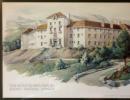Berengaria on the map. Berengaria Navarrese. Walk around the Berengaria Hotel
Berengaria, Queen of Castile.
Berengaria the Great, Berengela the Great
Berengaria el Grande, Berenguela el Grande
Years of life: 1180 - November 8, 1246
Years reigned: 1217
Father: Alphonse VIII .
Mother: Leonora of England
Husbands:
(1) Conrad von Hohenstaufen, Duke of Swabia
(2) Alfonso IX
, King of Leon
Sons: Ferdinand, Alphonse
Daughters: Berengaria, Constance
After the quick death of her first husband, the Duke of Swabia, in 1197 Berengaria remarried Alfonso IX of Leon . In 1204, the pope divorced them due to close kinship (Berengaria was her husband's cousin). Berengaria returned to Castile, taking the children with her. Alphonse tried to deprive them of their rights to the throne in favor of their daughters from their first marriage. The Leonese crown was promised to Jean de Brienne, who was to marry Sancha. But the clever Berengaria persuaded Brienne to marry her daughter, who was also named Berengaria.
After the death of her father, Berengaria led the party of supporters of the young king Enrique against Count Alvaro Lara, and after his sudden death, she abdicated the throne in favor of her son Ferdinand. After Alfonso IX died in 1230, Berengaria helped her son take the Leonese throne. And in the future, she helped Ferdinand in every possible way to govern the state, pacifying the rebellious nobility, and organized both of her son’s marriages.
Materials used from the site Great Encyclopedia of the Russian People - http://www.rusinst.ru
Read further:
Alphonse VIII- King of Castile (Spain), who reigned in 1158-1214, father of Berengaria.
Alfonso IX(1166-1230), king of Leon from the family of Castilian kings, reigned 1188-1230. , husband of Berengaria.
Hotel Berengaria− the famous Cypriot resort... of the mid-20th century. The word "Berengaria" (emphasis on the "a") in Greek sounds like "Verenaria". Keep this in mind if you suddenly want to ask the Cypriots for directions to the hotel. When people trust us in Cyprus, we never include this place in the “itinerary” unless specifically asked. Surprisingly, they ask quite often, so we are simply “forced” to talk about it today.
If you intend to go to Kykkos from Limassol, your route will definitely pass through a mountain village Prodromos, where this hotel once took refuge. The island at that time was completely owned by the British. For them, Cyprus was both an outpost in the Middle East and a source of “profit” - copper ore, for example from the Kalavassos region, went straight by rail to the seaport of Vasilikos. Didn't you know about the railways in Cyprus? Yes they were! Even for passenger traffic, as we talked about in the story about the Cyprus Railway Museum in Evrychou. But let's return again to the topic of today's story.
History of the Berengaria Hotel
In 1927, a very enterprising and very persistent Cypriot named Ioannis Kokkalos began to build a fashionable hotel in Prodromos. Why stubborn? Yes, because at first things didn’t work out - in 1928, the necessary metal structures were not delivered, and in the winter the half-built building began to crack. A lot had to be changed, but in 1931 the Berengaria Hotel opened its doors to its first visitors.
This was something extraordinary for Cyprus. We managed to find a number of photographs on the Internet. These are both real photographs of interiors and postcards with his image. Let's take a look at some of them.






Now that everyone has “breathed” the air of the past era, let’s continue the story.
The hotel is located at an altitude of 1400 m above sea level, which means that in the summer heat it is 10-15 degrees lower than on the coast. Coniferous trees growing around create shade, so even daytime walks at a temperature of 23 degrees (and not 35, as on the shore) took place in comfortable conditions. Those wishing to take a “water treatment” could take a dip in the pool. Its dimensions, by modern standards, are not very large. But you just remember where “modern standards” are and where 1931 is.
Having heard about such an oasis of splendor, not at all poor people from nearby (and not only) countries began to come here. King of Egypt Farouk I, British Prime Minister Winston Churchill, and other official and simply rich people visited here.
The hotel flourished for several decades and could still delight guests today if what happened had not happened. It all started with the death of Ioannis Kokkilos, the owner of the hotel. He had three sons, who inherited Berengaria. If only my father’s economic acumen would have come into play. At first, everything went along the well-worn path - the hotel was making a profit, and the sons were only concerned with how to divide it. At least that's what Cypriots say about it today. No money was allocated for maintenance and restoration, and it all ended with the hotel’s license being revoked in 1984. But that’s not all, but we’ll talk about that a little later.
For now, let's look at the current state of the building, the view of which opens up on the approaches to it, from the area of the Trikukka monastery. Our photo cannot convey the building in axonometry. To do this, you would need to jump higher, or use special equipment, such as a drone. But other people did it for us, whose “tags” are saved in the last photo. And they had better luck with the clouds.



Myths and legends about the Berengaria Hotel
Let's start not with them, but with the name of the hotel. Berengaria of Navarre is the only princess of England to marry outside her homeland. The groom was the King of England, Richard the Lionheart. True, before the wedding he had to do a little “work” - to capture Cyprus, which was not at all part of Richard’s plans at that time. We talked about this “detective” story in detail in an article about the Medieval Castle of Limassol, which is often called Richard's Castle, so we won’t repeat it.
The Berengaria Hotel's coat of arms featured a lion and a unicorn, just like the Royal Arms of Great Britain. This was most likely to emphasize the status of the hotel. Let's look at the emblem from the old business card and today's one, emblazoned on the main square of Prodromos, in the area of which we left the car in order to walk to the hotel.




Does the lion pose remind you of anything? If not, then take a closer look at the car emblem, which is also included in the frame. But we have not yet told about the further development of events. Local legends are already involved here.
So, three brothers began to manage the hotel. Well, how to manage, they rather let things take their course. And then tragic events happened one after another, as a result of which all three brothers died. The legend mixes in unrequited love for the same girl, or maybe just an evil fate hangs over the brothers due to failure to fulfill their father’s behests? They say that one of the brothers drowned in the pool, the second hanged himself, and the third shot himself. Horrible in general. A horror film could be made on this topic.
But people’s imagination did not stop, and the history of the hotel acquired even more dramatic details over time. Several more deaths followed, and now the ghosts of everyone roam the dilapidated hotel at night. It's good that we came here during the day.
Now is the time to go to the hotel and take a short walk around its territory, if after the knowledge gained you still have the desire, of course.
Walk around the Berengaria Hotel
So, from the square we go towards the hotel. Now his building is already visible behind the trees.

At first, they decided to simply walk around the perimeter of the building and first of all looked into the courtyard with a swimming pool in which one of the brothers drowned. The pool still exists with rainwater splashing in it.


One of the walls of the hotel has begun to collapse, so even going inside is already dangerous. At least that's what they say. When we were there, access to the territory was free. Later, the hotel perimeter was fenced off. But people still find loopholes, and the number of thrill-seekers does not decrease.

Let's go in and see the hotel from the inside. Although today you can only see bare walls. Right after closing, everything in it remained in its place, but gradually floated away somewhere. One can only guess where.
Immediately upon entering we find a staircase leading to the upper floors. Almost nothing reminds the eye of its former greatness. You just have to use your imagination, distracting yourself from the freshly baked “frescoes”.

Now let's explore the hotel a little, including its upper floors.



To be honest, Lena kept urging me to get out of there as quickly as possible. Maybe that’s why they didn’t shoot much there, like in other places. I didn’t care (men are usually ruder creatures), but she didn’t like the aura. In general, we quickly went back to the air.
Everything is fine with the air and the surrounding nature here. It was in February; the weather at that time can be unstable. Either the whole sky will be covered with clouds, then the sun will fade away again. Before visiting the hotel it was completely cloudy, but after it the weather cleared up, and nature gave us the opportunity to take a beautiful shot called “The Blanket”.
Ghosts hiding in the darkness of the castle, ghosts having fun with their guests, stories of local residents about terrible events that took place nearby - a place overgrown with legends... Do you think we are talking about France, Great Britain or Romania? Do you think that we will tell you a story about one of the European castles? Not at all. We are talking about Cyprus.
Today we will introduce you to one of the most unusual and abandoned hotel “Berengaria”, hidden in the mountains (Troodos) near the village of Prodromos.
The history of Berengaria
 Once upon a time this hotel was the most luxurious in Cyprus, truly royal. Even the name itself was given to the hotel in honor of Queen Berengaria, the wife of Richard the Lionheart, who married her in the castle.
Once upon a time this hotel was the most luxurious in Cyprus, truly royal. Even the name itself was given to the hotel in honor of Queen Berengaria, the wife of Richard the Lionheart, who married her in the castle.
Local residents considered it an honor to supply the hotel kitchen, and winemakers competed for the right to present their nectar to the royal table. And for good reason! After all, the hotel served as a haven for royalty and other titled persons.
Here it was customary to go down to dinner wearing velvet gloves, and the stairs and halls still retain their former grandeur. It seems that we are talking about the Titanic, which sank in the depths of the sea, the legends of which are still alive. So what caused the “flooding” of this magnificent mountain hotel?
Its owner, one of the residents of the village of Prodromos, built it in 1930. Berengaria became the first large hotel in Cyprus. Realizing that holidays in the mountains were becoming popular among the British, he collected available funds, borrowed some of the money from friends and did not skimp on investing in the construction of a luxury hotel, which quickly paid for itself.
The mid-twentieth century (50-70s) became the golden time for the hotel. Local residents came here for the weekend, and hundreds of Europeans escaped here from the sultry beaches of the island.
 It was impractical to go to the hotel just for a day: to get here, you had to spend 2-3 hours traveling one way on a village bus. Agree, not the most pleasant journey...
It was impractical to go to the hotel just for a day: to get here, you had to spend 2-3 hours traveling one way on a village bus. Agree, not the most pleasant journey...
The hotel is full of echoes of a bygone era of its grandeur, as if permeated with ghostly pictures of the past: here is a leisurely breakfast on a huge terrace, which offers a magnificent view of Troodos, and here is a swim in the endless pool, lunch and relaxation with a book in hand, conversations over the traditional five o' clock tea, dinner, which brings together the most famous and rich people from all over Europe, musical evenings...
Yes, once upon a time some of the best musicians played behind these “dark eye sockets of empty windows.”
The Legend of the Abandoned Hotel
 What happened next? Why is this beautiful hotel now in a deplorable state, and its walls are “decorated” with inscriptions in different languages? Now the hotel evokes unpleasant thoughts about the frailty of all living things, especially when the wind howls in the bare corridors of the castle. Like the skeleton of a prehistoric animal, Berengaria stands silently in Troodos.
What happened next? Why is this beautiful hotel now in a deplorable state, and its walls are “decorated” with inscriptions in different languages? Now the hotel evokes unpleasant thoughts about the frailty of all living things, especially when the wind howls in the bare corridors of the castle. Like the skeleton of a prehistoric animal, Berengaria stands silently in Troodos.
According to legend, the hotel owner had three sons. Before his death, he bequeathed to them to divide all their existing property equally into three, the same “fate” awaited the hotel. The father believed that his sons would be able to avoid quarreling because they would run the business together.
This was the case for several years. However, then disputes began over the division of profits from the hotel. Behind these disputes, the hotel was forgotten... No one wanted to invest money in reconstruction or take matters seriously.
All three subsequently died under mysterious circumstances. For example, the eldest of the brothers is said to have thrown himself from a bridge when he encountered serious financial difficulties. Local residents also believe that the father and his beloved “Berengaria” took revenge on the brothers for an unfulfilled promise.
The hotel has been abandoned for over 30 years. During this time, local residents removed from it everything that could have at least some benefit in the village economy.
Is the legend true? Do local residents hear terrible howls and rustling of heavy velvet clothes?
Don't be scared, the place is really interesting and still makes a strong impression. Residents of the village of Prodromos say that the hotel guests are not in any danger. Its owners, despite everything, out of habit, greet travelers with traditional Cypriot hospitality. And near the abandoned hotel you will even find a couple of “love trees”.
Foggy future
 The hotel is often visited by “informed” tourists who want to wander around the ruins. Those who want to walk the stairs where Winston Churchill, the Duke of Marlborough, King Farouk I of Egypt once stepped...
The hotel is often visited by “informed” tourists who want to wander around the ruins. Those who want to walk the stairs where Winston Churchill, the Duke of Marlborough, King Farouk I of Egypt once stepped...
This list can be continued indefinitely. And the first President of Israel, Chaim Weizmann, even lived in the hotel for quite a long time and ruled his state from here.
Will the hotel have another chance? A few years ago, a German construction company received permission to renovate the hotel.
Now the work has been suspended for unknown reasons, perhaps it won’t be long until the beautiful Queen Berengaria will open its doors again to welcome guests from all over the world, luxurious balls will be held again and music will be played, and the village of Prodromos will be illuminated with bright light and will be able to be proud again title of the place having the best hotel in Cyprus. Who knows?
Berengaria is one of the most mysterious hotels in the world, with ghosts and a terrible history.
Video Berengaria – haunted abandoned hotel
There are no more mysterious places in Cyprus! After sunset, ghosts begin to walk around the abandoned hotel and curse each other.
The mysterious Berengaria Hotel is located near the village of Prodromos in the Trodoos Mountains.

The hotel is named after Queen Berengaria of Navarre, wife of the English king Richard the Lionheart.
You're probably thinking, what does this have to do with these famous historical figures? During the third crusade in 1191 to the Holy Land in Acre, due to a strong storm, King Richard and the princess Berengaria accompanying him had to make a forced stop in Cyprus. It so happened that a whole series of adventures awaited the English royal family on the island, but this is completely different. The most important event took place on May 12, 1191, in the Limassol castle that has survived to this day, King Richard and Berengaria got married.

Cypriots are very fond of this period in the history of Cyprus, when King Richard and his knights, cheerfully waving their swords, rushed around the island and created beautiful legends. And in order to make the hotel truly the most flagship hotel in Cyprus, it was named after the beautiful Berengaria of Navarre, the wife of King Richard.
The Berengaria Hotel was built in 1930 and at that time it was the most luxurious hotel in Cyprus. Since the island was a British colony at that time, rich Englishmen came here to relax.


The golden time of the Berengaria Hotel was in the 1950s-1970s. Such famous personalities as Winston Churchill, King Farouk I of Egypt and the Duke of Marlborough vacationed here. Also, the first President of Israel, Chaim Weizmann, lived in the hotel for a long period, and he even ruled his country from there.
The hotel has its own swimming pool, park, vineyards.

What happened to the Berengaria Hotel, why did it become a haunted building?
According to history, the innkeeper had three sons. Before his death, he bequeathed to them not to divide the existing property into three, but to conduct and develop the business together.
But the greedy sons tried to snatch their pieces and not engage in the work of the hotel - no one planned to invest profits in the development and maintenance of the hotel.
Over time, quarrels began to break out more and more often between the brothers over money.
And then they began to die mysteriously...
The eldest brother jumped into the pool upside down and broke his neck, allegedly due to serious financial problems.

The middle of the brothers hanged himself in a restaurant, allegedly because of unrequited love.

The younger one shot himself near the fireplace, allegedly because of a failed career.
- The hotel officially ceased operations in 1984.
In general, no one remembers exactly what happened and how, but every evening, under the howling of the wind, the three of them begin to walk around the hotel and whisper all night about how to divide the money.
Pilgrims who go to monasteries or never stop near this hotel are afraid and cross themselves.
Sometimes it happens that a rare traveler stops at a hotel for the night, but then no one sees him - as if there was no tourist at all.

And during the day, the brothers stand in front of the entrance to the hotel in the form of a tree, with roots from two parents, and the top of three brothers, and guard their property.

- Local residents, who had stolen everything from the hotel that could have at least some value, lost their minds; their brothers came to them and asked for the property to be returned.
Therefore, not far from the hotel there is a house where locals bring things from Berengaria and beyond. In this house you can see various receipts, old envelopes with stamps and colonial prospectuses.

Among the various rubbish that villagers bring into the house, there are antique irons, antique pressure gauges, and stove grates.
And what do you think happens to these damn things? That's right, tourists take them with them! And of course, the bravest tourists who don’t believe in anything are from Russia.
In general, this is all the local residents need - the brothers are looking for things from the Berengaria Hotel all over the world, more precisely in Russia, and this, you must admit, is not a small country . We don’t know what ghosts usually drive on, but they are definitely terrified of Russian roads. It can be assumed that soon these ghosts will not only wander around the hotel, but also swear in pure Russian.
Why not restore the Berengaria Hotel?
The brothers do not allow the hotel to be restored.
Relatively recently, a German construction company received permission to reconstruct the hotel. But then construction work was stopped for unknown reasons.
They say that the architect who developed the plan for the reconstruction of Berengaria drowned himself.
A terrible story...
Well? Anyone looking for some thrills in Cyprus? Hotel Berengaria is waiting for new guests!
Book an excursion to Berengaria
The section is very easy to use. Just enter the desired word in the field provided, and we will give you a list of its meanings. I would like to note that our site provides data from various sources - encyclopedic, explanatory, word-formation dictionaries. Here you can also see examples of the use of the word you entered.
The meaning of the word berengaria
Berengaria in the crossword dictionary
Wikipedia
Berengaria (Queen of Castile)
Berengaria of Castile, Also Berengaria the Great(1179/1180, Burgos - November 8, 1246, ibid.) - Castilian infanta, wife of King Alfonso IX of León, queen of Castile and Toledo in 1217.
Berengaria was the daughter of the Castilian king Alfonso VIII and for a long time after her birth remained his presumptive heir, which made the infanta a desirable bride in Europe. Berengaria's first husband was Conrad II, the future Duke of Swabia, but the marriage with him remained unconsummated and was dissolved at the insistence of the infanta Alienora of Aquitaine's grandmother. After Conrad's death, Berengaria married King Alfonso IX of Leon, with whom she gave birth to five children. The marriage to Alfonso was not recognized by the church and was dissolved in 1204, although their children received the status of legitimate children. Berengaria returned to her parents in Castile, where she devoted herself to raising her children.
In 1214, Berengaria's young brother Enrique became king and, after his mother's short regency, Berengaria succeeded her in this position. However, she was soon removed from the regency over her brother and was forced to leave the capital. In 1217, Enrique died suddenly after suffering a head injury while playing with other children. Berengaria, in the absence of other more legitimate heirs, was declared queen. Berengaria's reign lasted just over a month, then, fearing the seizure of power by her former husband, she abdicated in favor of their common son. After her abdication, the former queen retained her influence on politics in the country and the private lives of her children. She also patronized religious organizations and historians until her death in 1246.
Berengaria (disambiguation)
Berengaria:
- Berengaria of Castile- Queen of Castile in 1217.
- Berengaria of Navarre- wife of King Richard the Lionheart.
- Berengaria portuguese- Queen of Denmark, wife of Valdemar II.
- "Berengaria"- British transatlantic liner.
Berengaria (liner)
Berengaria is the first transatlantic liner of the Imperator class, originally built for the Hamburg-Amerikanische Packetfahrt-Actien-Gesellschaft (or HAPAG) as a liner under the name Imperator. At the time of her launch in May 1912, she was the largest passenger ship in the world, surpassing the sinking Titanic. After serving in the US Navy during World War I, the Emperor was transferred to Cunard Line as part of war reparations, and sailed as the company's flagship under the name Berengaria for the remainder of her career.






